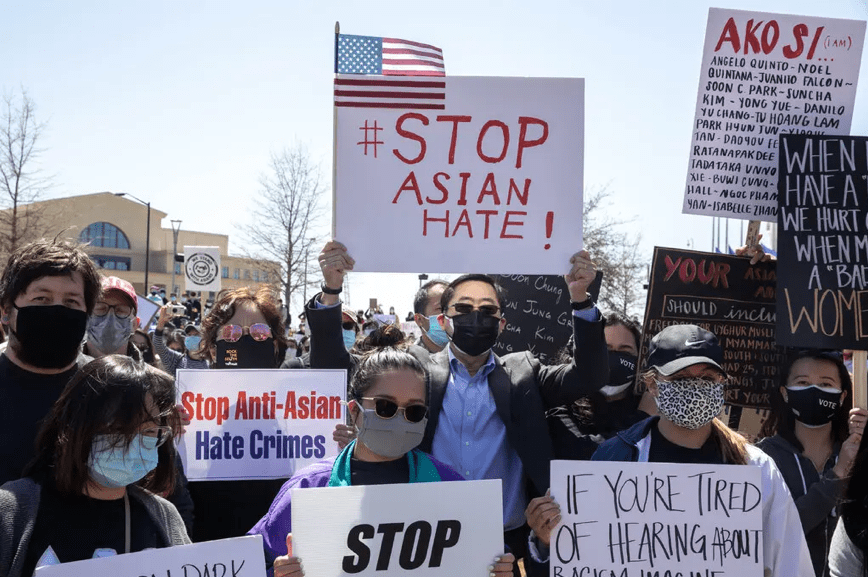#Stop Asian Hate
By Maeve Galvin, Bella Gilmartin, and Talía Hall
Imagine it is March 2020. You are masked up, distanced from everyone, and waiting to board your flight home after being evacuated from college. In the corner of your eye, you see a rather large, sweaty white man slowly come near you. Out of nowhere you are attacked by a glob of his vile, wet saliva as he proceeds to berate you, screaming an Asian slur in your face. His assault goes ignored by those around you, and you are forced to process his violence alone in a world of indifferent spectators. This is the disturbing tale of a friend of mine and one that has been experienced in some variation by many Asian-Americans during the COVID-19 pandemic. The tensions of quarantine combined with the prevalence of hate-filled rhetoric being spewed in all forms of media led to a drastic increase in hate towards Asian and Pacific Islander communities.
According to Pew Research Center, over 58% of Asian American adults have reported an increase in slurs used against them since the start of the pandemic. Also from Pew, 32% of Asian Americans now fear that they might be attacked because of their race, and 81% of the Asian American community say that violence against them is increasing since the beginning of Covid. The group “Stop AAPI Hate” has reported over 2,800 instances of hate against Asians and Pacific Islanders during 2020. These incidents include the stabbing of two Asian American women in broad daylight in San Francisco, the setting on fire of a Chinese woman in Brooklyn, and the hitting on the head of an Asian American woman in New York City with a hammer. The population of over 23 million Asian Americans and Pacific Islanders in the U.S. have seen a 146% increase in hate crimes as opposed to only a 2% increase in hate crimes nationally according to a study by the Center for the Study of Hate and Extremism at California State University. However, this is not an issue localized to the United States of America. The entire world saw a rise in Anti-Asian sentiments over the years following the emergence of the pandemic. Mai-Anh Peterson the founder of besea.n (Britain’s East and South Asian Network) noted that “we are all feeling the collective trauma” of the ongoing global rise in AAPI hate crimes. “It also has a wider ripple impact on the Asian diaspora worldwide, because of course, we know that this isn’t just a problem for North America.” U.N. Secretary General Anthony-Guterres warned the global public that “the pandemic continues to unleash a tsunami of hate and xenophobia, scapegoating and scare-mongering.” He then urged governments to “act now to strengthen the immunity of our societies against the virus of hate.” Nevertheless, numerous countries have reported spikes in the levels of hate crimes directed towards their Asian and Pacific Islander populations over the past year and a half.
The increase in violence and hate speech directed towards the AAPI community in the U.S. can be partially tied to a March 2020 tweet from President Donald Trump. On the night several Asian women were shot dead in Atlanta, he absurdly referred to COVID-19 as the “China Virus.” He maintained this rhetoric through his public communications, such as “I would like to begin by announcing some important developments in our war against the Chinese virus.” A study from the University of California, San Francisco traced the use of “#chinavirus” to reference the pandemic in comparison with “#covid19.” Over half of the time “#chinavirus” was paired with one or more racially derogatory hashtags as opposed to only 20% of the time with “#covid19.” There is a clear a link between Trump’s quote and a rise in anti-Asian rhetoric.
Following the racially motivated attacks on Asian American communities, hundreds of people began to flood the streets marching and chanting for an end to the surge in Anti-Asian racism and violence. They waved signs in the air saying, “#Stop Asian Hate” and “Enough is enough.” The “Stop Asian Hate” movement eventually began to trend on all social media platforms. Many social media influencers took to Instagram and Twitter to stand against Asian Hate crimes. Influential voices such the editor of Allure magazine, Michelle Lee, posted videos on social media recounting her personal experiences with Asian Hate to spread awareness using the hashtag #StopAsianHate.
In the human community lies the hope we so desperately need. In these darkest of times people have come together to defend each other and speak out against racism and prejudice. The strain of the pandemic has illuminated many—perhaps countless—cracks in the foundation of our society, but protests and policy against anti-Asian hate demonstrate that most people long for a world where no one has to fear violence.
Works Cited
“Covid ‘Hate Crimes’ against Asian Americans on Rise.” BBC News, BBC, 21 May 2021, https://www.bbc.com/news/world-us-canada-56218684.
Haynes, Suyin. “Anti-Asian Attacks and Hate Crimes on the Rise Worldwide.” Time, Time, 22 Mar. 2021, https://time.com/5947862/anti-asian-attacks-rising-worldwide/.
Kim, Young. “The Painful History of Anti-Asian Hate Crimes in America.” CBS News, CBS Interactive, 1 Aug. 2021, https://www.cbsnews.com/news/the-painful-history-of-anti-asian-hate-crimes-in-america/.
Levin, Brian. Report to the Nation: Anti-Asian Prejudice & Hate Crime. California State University – San Bernardino, 2021, https://www.csusb.edu/sites/default/files/Report%20to%20the%20Nation%20-%20Anti-Asian%20Hate%202020%20Final%20Draft%20-%20As%20of%20Apr%2030%202021%206%20PM%20corrected.pdf.
Ruiz, Neil G., et al. “Many Black, Asian Americans Say They Have Experienced Discrimination amid Coronavirus.” Pew Research Center’s Social & Demographic Trends Project, Pew Research Center, 1 July 2020, https://www.pewresearch.org/social-trends/2020/07/01/many-black-and-asian-americans-say-they-have-experienced-discrimination-amid-the-covid-19-outbreak/.
Image credit: Jeenah Moon/New York Times, in Kim, Juliana, et al. “Protesters Gather in Atlanta to #StopAsianHate.” The New York Times, 20 Mar. 2021, https://www.nytimes.com/2021/03/20/us/stopasianhate-protest-atlanta.html.

